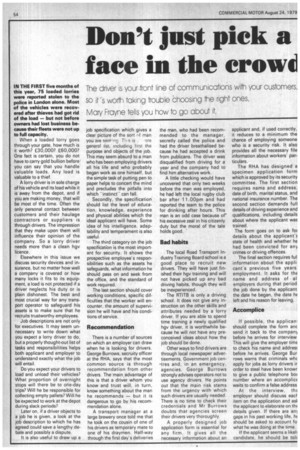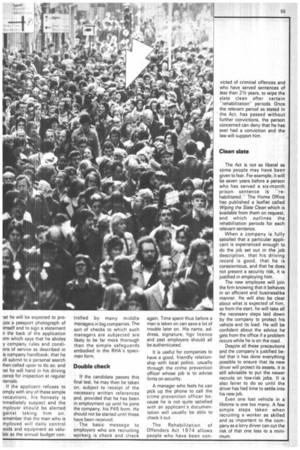Don't just pick a face in the crows]
Page 56

Page 57

If you've noticed an error in this article please click here to report it so we can fix it.
The driver is your.front line of communication. s with your customers, SO it's won taking trouble 'choosing ne right ones, Mary Frayne tells you how to go about it,
IN THE FIRST five months of this year, 75 loaded lorries were reported stolen to the police in London alone. Most of the vehicles were recovered after thieves had got rid of the load — but not before owners had lost business because their fleets were not up to full capacity.
When a loaded lorry goes through your gate, how much is it worth? £30,000? £60,000? One fact is certain, you do not have to carry gold bullion before' you can say that you handle valuable loads. Any load is valuable to a thief.
A lorry driver is in sole charge of his vehicle and its load while it is away from the depot, and if you are making money, that will be most of the time. Often the only personal contact between customers and their haulage contractors or suppliers is through drivers. The impression that they make upon them will influence their opinion of the company. So a lorry driver needs more than a clean hgv licence.
Elsewhere in this issue we discuss security devices and insurance, but no matter how well a company is covered or how many locks it fits to its equipment, a load is not protected if a driver neglects his duty or is plain dishonest. The best and most crucial way for any transport operator to safeguard his assets is to make sure that he recruits trustworthy employees.
Job descriptions are not only for executives. It may seem unnecessary to write down what you expect a lorry driver to do, but a properly thought-out list of tasks and responsibilities helps both applicant and employer to understand exactly what the job will entail.
Do you expect your drivers to load and unload their vehicles? What proportion of overnight stops will there be to one-day trips? Will he be responsible for collecting empty pallets? Will he be expected to work at the depot during slack periods?
Later on, if a driver objects to a job he is given, a look at the job description to which he has agreed could save a lengthy debate and possibly a dispute.
It is also useful to draw up a
job specification which gives a clear picture of the sort •,..f man you are seek;no Th.s is . 'ore genera! list, including first the purpose and objects of the job. This may seem absurd to a man who has been employing drivers all his life and who probably began work as one himself, but the simple task of putting pen to paper helps to concert the mind and precludes the pitfalls into which "instinct" can fall.
Secondly, the specification should list the level of education, knowledge, experience and physical abilities which the ideal applicant will have. Some idea of his intelligence, adaptability and temperament is also useful.
The third category on the job specification is the most important for security. It shows the prospective employee's responsibilities such as the assets he safeguards, what information he should pass on and seek from the office, and the standard of work required.
The last section should cover working conditions, specific difficulties that the worker will encounter, the amount of supervision he will have and his conditions of service.
Recommendation
There is a number of sources on which an employer can draw when he is looking for drivers. George Burrows, secruity officer at the RHA, says that the most common source is through recommendation from other drivers. The main advantage of this is that a driver whom you know and trust will, in turn, know something about the man he recommends — but it is dangerous to go by his recommendation alone.
A transport manager at a large brewery once told me that he took on the cousin of one of his drivers as temporary mate to one of his draymen. Half-way through the first day's deliveries the man, who had been recommended to the manager, secretly called the police and had the driver breathalised because he had accepted a drink from publicans. The driver was disqualified from driving for a year and the company had to find him alternative work.
A little checking would have uncovered that only two weeks before the man was employed, he had left the local rugby club bar after 11.00pm and had reported the team to the police for drinking after hours. This man is an odd case because of his excessive zeal in his citizenly duty but the moral of the tale holds good.
Bad habits
The local Road Transport Industry Training Board school is a good place to recruit new drivers. They will have just finished their hgv training and will not have picked up any bad driving habits, though they will be inexperienced.
The RTITB is only a driving school. It does not give any instruction on the other skills and attributes needed by a lorry driver. If you are able to spend time training a newly qualified hgv driver, it is worthwhile because he will not have any preconceived ideas about how the job should be done.
Other ways to find drivers are through local newspaper advertisements, Government job centres and, in an emergency, agencies. George Burrows strongly advises operators not to use agency drivers. He points out that the main risk stems from the urgency with which such drivers are usually needed. There is no time to check their credentials and Mr Burrows doubts that agencies screen their drivers very thoroughly A properly designed job application form is essential for any firm. It gives all the necessary information about an applicant and, if used correctly, it reduces to a minimum the chance of employing someone who is a security risk. It also provides all the necessary file information about workers' particulars.
The RHA has designed a specimen application form which is approved by its security committee. The first section requires name and address, date of birth, marital status, and national insurance number. The second section demands full details of driving experience and qualifications, including details about where the applicant was trained, The form goes on to ask foi details about the applicant's state of health and whether hE had been convicted for any crimes or driving offences.
The final section requires ful information about the appli• cant's previous five years employment. It asks for thE name and address of al employers during that period the job done by the applicant the date he began, the date hE left and his reason for leaving.
Accomplice If possible, the applican. should complete the form anc send it back to the company before he arrives for interview This will give the employer timE to check his name and addres: before he arrives. George Bur rows warns that criminals whc apply for jobs as lorry drivers ir order to steal have been knowr to give a public telephone bo) number where an accomplicE waits to confirm a false address
At the interview, thE employer should discuss eacf item on the application and as1 the applicant to elaborate on thE details given. If there are an gaps in his past working life, hE should be asked to account fo what he was doing at the time.
If the applicant seems a likel) candidate, he should be tolc
lat he will be expected to prouce a passport photograph of imself and to sign a statement n the back of the application )rm which says that he abides y company rules and condions of service as described in is company handbook: that he rill submit to a personal search 'hen called upon to do so; and -let he will hand in his driving cence for inspection at regular itervals.
If the applicant refuses to amply with any of these simple recautions, his honesty is nmediately suspect and the mployer should be alerted gainst taking him on. emember that the man who is mployed will daily control oods and equipment as valuble as the annual budget con
trolled by many middle managers in big companies. The sort of checks to which such managers are subjected are likely to be far more thorough than the simple safeguards embodied in the RHA's specimen form.
Double check
If the candidate passes this final test, he may then be taken on, subject to receipt of the necessary written references and, provided that he has been in employment up until he joins the company. his P45 form. He should not be started until these have been received.
The basic message to employers who are recruiting worker is check and check again. Time spent thus before a man is taken on can save a lot of trouble later on. His name, address, signature, hgv licence and past employers should all be authenticated.
It is useful for companies to have a good, friendly relationship with local police, usually through the crime prevention officer whose job is to advise firms on security.
A manager who feels he can pick up the phone to call the crime prevention officer because he is not quite satisfied with an applicant's documentation will usually be able to check it out.
The Rehabilitation of Offenders Act 1974 allows people who have been con victed of criminal offences and who have served sentences of less than 21/2 years, to wipe the slate clean after certain "rehabilitation" periods. Once the relevant period as stated in the Act, has passed without further convictions, the person concerned can deny that he has ever had a conviction and the law will support him.
Clean slate
The Act is not as liberal as some people may have been given to fear. For example, it will be seven years before a person who has served a six-month prison sentence is "'rehabilitated." The Home Office has published a leaflet called Wiping the Slate Clean which is available from them on request, and which outlines the rehabilitation periods for each relevant sentance.
When a company is fully satisifed that a particular applicant is experienced enough to do the job set out in the job description, that his driving record is good, that he is conscientious, and that he does not present a security risk, it is justified in employing him.
The new employee will join the firm knowing that it behaves in an efficient and businesslike manner. He will also be clear about what is expected of him, so from the start, he will take all the necessary steps laid down by the company to protect his vehicle and its load. He will be confident about the advice he gets from the office if a problem occurs while he is on the road.
Despite all these precautions and the company's justified belief that it has done everything possible to ensure that its new driver will protect its assets, it is still advisable to put the newer recruits on low-risk jobs. It is also fairer to do so until the driver has had time to settle into his new job.
Even one lost vehicle in a lifetime is one too many. A few simple steps taken when recruiting a worker as skilled and as important to the company as a lorry driver can cut the risk of that one loss to a minimum.








































































































